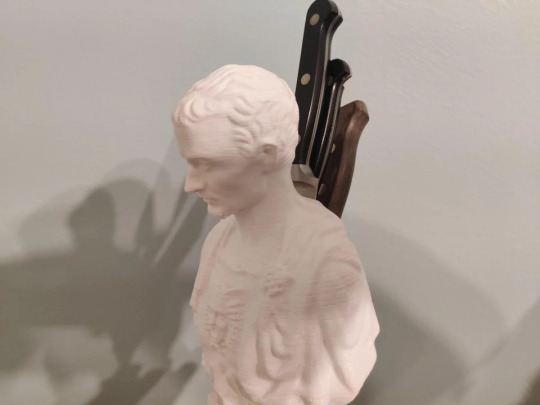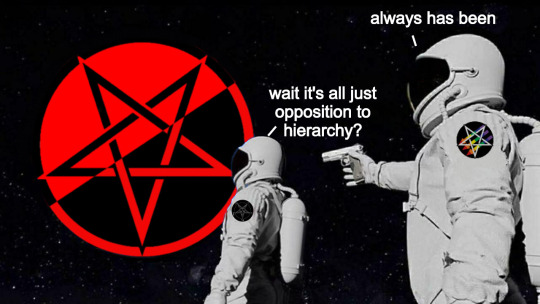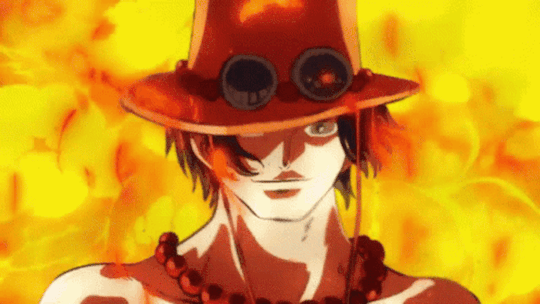#academic anarchy
Text
youtube
#subscribe#473x4ndr14#music video#cyber/techno art#c0p3rn1can r3c0rd5: an ok copernicus production#need followers#soundcloud#music#youtube#edm#an ok copernicus production#art hard#academic anarchy#c0p3rn1can r3c0rd5#join us#follow#support musicians#support artists
3 notes
·
View notes
Text






Have some bloody Jax... for academic purposes (;
#academic purpose: I like my men bloody#jax teller#jackson teller#sons of anarchy#soa#my edits#tw: blood#(fake blood but still)#charlie hunnam
94 notes
·
View notes
Text
"God is everything, man is nothing, says religion. But out of that nothing God has created a kingdom so despotic, so tyrannical, so cruel, so terribly exacting that nought but gloom and tears and blood have ruled the world since gods began."
-Emma Goldman
#anarchism#anarchy#literature#writer#writing#author#commentary#politics#god#religion#political science#academia#academics
11 notes
·
View notes
Text
Anarchist Studies, Volume 14, Issue 1, pp. 84–91
2006
Research Note: Αναρχία—What did the Greeks actually say?
URI GORDON
Doctoral Candidate in Politics
University of Oxford
[email protected]
ABSTRACT
This article examines a range of uses to which the word “anarchy” and its derivations were put in ancient Greek sources. Perhaps not surprisingly, the majority of instances indicate that the negative application of the word as a synonym for confusion and disorder was prevalent from ancient times. However, there are also several eminently political uses, which are quite telling in their prefiguration of contemporary anarchist values—namely the Athenians’ reference to 404 BC as the “year of anarchy”; the uses of the word by Plato and Aristotle in their critiques of democracy; and the association of anarchy with the defiant actions of Antigone in the plays of Aeschylus and Sophocles.
The ancient Greek origin of the word “anarchy” is a matter of common knowledge, and it has become a predictable convention to mention it at the outset of almost any discussion of anarchism as a political movement in the modern era. At the same time, as far as I am aware, no one has ever looked at the actual functioning of the word in classical sources. Instead, anarchist and non-anarchist commentators alike have inevitably satisfied themselves with second-hand exercises in Greek etymology, removing the word from its discursive context and ignoring the complex array of meanings it had for ancient writers. What I propose here, then, is to give attention to the actual uses to which the word was put in classical Greek. As I think will become immediately clear, such an exercise is of more than a merely historical interest.
Greek political culture revolved around citizenship in the polis, the city-state form that dominated political organization in the Hellenic world form the archaic period (c.800 BC) to the strong-armed unification of Greece under Alexander the Great (356–323 BC). Due in part to the peninsula’s geographic conditions, which meant that many settlement-clusters developed in relative isolation, poleis bringing together hundreds of farming households were largely self-sufficient and enjoyed economic and political autonomy for centuries. The typical Greek polis was a complex hierarchical society, with chattel slavery in agricultural households serving as its economic base. Sharply separated from domestic life was the citizen body, in which a certain rough equality obtained among male property owners. Citizenship was not necessarily “democratic”—in Sparta, all soldiers/citizens belonged to an assembly that elected a ruling council, which had legislative authority and advised the King. But in whatever form, the ideal of citizenship in a united political community seems to have been universally accepted by all literate classes. The polis itself was a matter for collective pride and was valued beyond question as the hallmark of the superiority of Greek civilization to the lifestyles of surrounding “barbarian” tribes. (See the bibliography for some further reading on the history and character of Greek political societies.)
Given the pervasive currency of this worldview, it is perhaps not surprising that, as T. A. Sinclair notes, “there was no philosophy of anarchy in Greek political theory.”[1] There are some possible exceptions to this observation: there were Cynics such as Antisthenes (a pupil of Socrates, c.444–365 BC) and his own pupil Diogenes of Sinope (412–323 BC), who looked with disdain on conventional values, wealth and social status, and who would have seen government as opposed to a life in full accordance with nature. Unfortunately only small fragments of Cynic writings have survived, but their ideas are thought to have later influenced Zeno of Citium (333–264 BC), founder of Stoicism, “who distinctly opposed his conception of a free community without government to the state-utopia of Plato… repudiated the omnipotence of the state, its intervention and regimentation, and proclaimed the sovereignty of the moral law of the individual.”[2] However, the Cynics’ purism drove them to oppose any organised intervention in politics, making their “anarchism” philosophical at best. While the ease with which later developments in Stoicism were appropriated for the peace of mind of the Roman emperor Marcus Aurelius (121–180 AD) shows that its anarchist resonances were neither obvious nor perennial. Finally, neither Cynics nor Stoics are known to have used the actual concept “anarchy.”
Surprisingly, the entire corpus of electronically surveyable literature in ancient Greek contains only 47 instances of the word “anarkhia” or its derivations.[3] Compared to 549 instances of “demokratia” and 422 of “oligarkhia” in the same database, the word does not seem to have occupied a significant place in the literary vocabulary of the time. Among these 47 instances, moreover, the majority of cases employ the word just as many non-anarchists might do today—as a catch-all synonym for confusion, disorder, tumult and license. Thus in the play Hecuba by Euripides (c.480–406 BC), the heroine, fearing for her daughter’s body, says that “the mob knows no restraint, and the unruliness [anarkhia] of sailors exceeds that of fire.”[4] Another playwright, Aeschylus (c.525–456 BC), has his Clytaemnestra (wife of king Agamemnon, who fought against Troy) recalling the warning that “the mob’s anarchic will [dêmothrous anarkhia] might overturn the Council.”[5] While the historian Thucydides (c.460–395 BC) attributes the military failures of the Syracusans in part to “the troops’ disorder [asyntakton anarkhian].”[6] The same type of usage is also found in the historical work of Herodotus (c.484–430 BC), as well as with later Greek-writing historians such as Diodorus Siculus (fl.50 AD) and Flavius Josephus (c.37–100 AD). We can thus see that, far from being a subsequent “corruption,” the negative and condemnatory connotations of the word anarchy have burdened it from earliest times.
Let us look, however, at other cases from ancient Greece in which the word anarchy is used in a more distinctly political sense. There is, for instance, the single occasion when a Hellenic population appears to have matter-of-factly used the word to refer to its own situation: the Athenian “year of anarchy,” 404 BC. This is something of a curiosity, since the circumstances of that year were anything but anarchic. As a matter of fact, Athens was at the time under the very strong rule of an oligarchy—The Thirty—installed by the Spartans following their victory in the second Peloponesian war of that same year. Moreover, there was literally an Archon in place, installed by the oligarchs, in the person of Pythodorus. However, according to the historian Xenophon (c.430–355 BC), the Athenians refused to apply here their custom of calling the year by that archon’s name, since he was elected during the oligarchy, and “preferred to speak of it as the year of ‘anarchy.’”[7] Despite its counter-intuitive appearance, this first popular application of the word anarchy is very telling. It resonates with a mass symbolic defiance, refusing the recognition that a ruler was supposed to receive in everyday language. It was this defiance which led to the restoration of democracy in Athens the following year.
Democracy, of course, was far from a positive ideal for the great political theorists of ancient Greece, Plato and Aristotle. And it was always in the context of discussing democracy that they made their rare uses of the word anarchy—making for the close association between the two concepts which would prevail well into the modern era.[8] The two philosophers’ famous mistrust of democracy, rooted in their contempt for popular power of any kind, was expressed in their arguments for democracy’s inherent vulnerability and its preponderance to deteriorate into tyranny. However, it should be noticed that what enabled Plato to present such arguments in the Republic was the complete detachment of his account of democracy from the realities of such systems of government, in Athens and elsewhere. Nowhere does his description reflect the constitution that sentenced his mentor Socrates to death, the structured, lawful and impeccably stratified Hellenic democracy. Instead, we find an account that comes very close to what we might intuitively call anarchy, though for Plato this is an entirely negative affair. In democracy, he says, there is no enforceable political authority or stability of the state, “no necessity… for you to govern… even if you have the capacity, or to be governed, unless you like, or to go to war when the rest go to war, or to be at peace when others are at peace, unless you are so disposed.”[9] This portrayal is what sets the ground for Plato’s account of such a state’s subsequent deterioration into tyranny. Democracy in his view makes for far too much equality. It loosens what Plato considered to be the natural hierarchy and authority obtaining between slave and master, man and woman, parent and child. His allegorical youngster’s soul, divided between an oligarchical self and a democratic self, is besieged by the corrupting and evil influence of the latter. Democracy causes the soul to “drink too deeply from the strong wine of freedom,” breeding desires whose false councils introduce “insolence and anarchy and waste and impudence hymning their praises and calling them by sweet names; insolence they term breeding, and anarchy liberty [anarkhian de eleutherian], and waste magnificence, and impudence courage.” So pervasive is the corruption that “anarchy finds a way into the private houses, and ends by getting among the animals and infecting them.”[10] In order to avoid the dangers of anarchy, Plato concludes that habits of dominance and obedience must be instilled deeply into the soul of the individual. “This task of ruling, and being ruled by, others must be practised in peace from earliest childhood; but anarchy must be utterly removed from the lives of all mankind, and of the beasts also that are subject to man.”[11]
It is important to note that, for Plato, anarchy is never a distinct class of political association. Since the concept is entirely subsumed into his discussion of democracy, it is not understood as requiring a separate theoretical category alongside oligarchy, tyranny, democracy, etc. Nevertheless, Plato’s account does supply us with an important understanding about anarchy that remains intact regardless of his crusade against it. This is that anarchy represents not merely the lack of government conceived as statelessness, but also the thorough erosion of rank in non-governmental spheres—between classes, age-groups and genders.
Aristotle’s association of anarchy with democracy is essentially identical to although his depiction thereof is never as colourful. The concept appears again as a form of democratic deterioration, but in keeping with Aristotle’s method it is appropriately situated in empirical observations rather than in metaphorical speculation. In democracies such as Thebes and Syracuse, we are told, the upper classes were motivated to stage a coup by their contempt for the prevailing “disorder and anarchy [ataxias kai anarkhias]” in the affairs of the state.[12] Also, in many cases the nobles will form factions with one another, and create them among the masses, “and so bring about a suspension of government [anarkhian].”[13] Alternately, in a tyranny Aristotle sees “democratic” features, namely “license among slaves” [anarkhia te doulôn] as well as among women and children. “A constitution of this sort,” he concludes, “will have a large number of supporters, as disorderly living [zên ataktôs] is pleasanter to the masses than sober living.”[14] Aristotle, like Plato, was not interested in delineating anarchy as a separate political form. However, unlike Plato, he is able to see anarchy as more than an abstractly corrupting influence, since its connection with democracy portrays it as desirable by the masses, and even as an implicit goal of popular insurrection.
The explicit connection of anarchy with a conscious human will appears only twice in classical Greek literature. This is perhaps the most intriguing example since, although penned by two different authors over a gap of several decades, they both refer to the same act by the same person. If we are looking for the first-ever anarchist, here she is:
Antigone: I at least will say something to the rulers of the Cadmeans: even if no one else is willing to share in burying him I will bury him alone and risk the peril of burying my own brother. Nor am I ashamed to act in defiant opposition [apiston tênd’anarkhian] to the rulers of the city. A thing to be held in awe is the common womb from which we were born, of a wretched mother and unfortunate father. Therefore, my soul, willingly share his evils, even though they are unwilling, and live in kindred spirit with the dead. No hollow-bellied wolves will tear his flesh, let no one “decree” that! Even though I am a woman, I will myself find the means to give him burial and a grave, carrying the earth in the fold of my linen robe. With my own hands I will cover him over—let no one “decree” it otherwise. Take heart, I will have the means to do it.[15]
In the person of Antigone, a long-standing inspiration to feminists, we also find a clear prefiguration of two of the most important concepts attached to anarchist practice in its contemporary idiom: disobedience and direct action. First, Antigone openly refuses to abide by the rulers’ decree to leave her brother Polyneices’ body unburied, as punishment for his participation in the attack on Thebes. She asserts that the bond of siblings born of a common womb stands above the authority of political powers, and rejects the legitimacy of any decree that transgresses this bond. While her appeal to values that stand above the law as a justification for her actions is by no means an exclusively anarchist refrain, and while on some interpretations these values are themselves grounded in a form of authority—the higher authority of the gods—it is the disobedient and insubordinate character of her action that she, in her own words, associates with anarchy. It should also be remembered that it was only in recent decades that the notion of justified, “civil” disobedience to the law acquired popular moral legitimacy. In earlier times, including those of the anarchist movement in the nineteenth and early twentieth centuries, the distinction between contingent and wholesale (i.e. anarchist) rejection of political authority was not as clear as it is today.
Second, we find in Antigone’s speech a striking example of the concept of direct action. She has no intention of appealing to the authorities in order to convince them of the immorality or illegitimacy of their decree, but rather takes that illegitimacy as her starting point, and sets about to take matters into her own hands and create by herself the alternate reality that she desires. Aeschylus, we may also note, has his chorus openly endorse Antigone’s defiance at the close of the play. Whatever action the authorities might take against her, they say, “We, at all events, will go and bury him with her, following the funeral procession. For this grief is shared by all our race, and the city approves, as just, different things at different times.”[16]
Picking up the narrative in Antigone, Sophocles has the autocrat Creon warn his son Heimon (who is also Antigone’s lover) of the dangers of her intended action:
Creon: There is no evil worse than disobedience [anarkhias de meizon ouk estin kakon]. This destroys cities; this overturns homes; this breaks the ranks of allied spears into headlong rout. But the lives of men who prosper upright, of these obedience has saved the greatest part. Therefore we must defend those who respect order, and in no way can we let a woman defeat us.[17]
Again the translator has well chosen to reflect the disobedient core of anarchy, whereas Sophocles himself cleverly exposes here the ambiguity and half-heartedenss of all rulers’ moralistic declamations in defence of obedience and authority. Is the issue here really the potential damage to the collectivity of such an act of disobedience going unpunished? Or is it rather the danger that such an example of defiance would posit to the stability of power itself and, even more poignantly, to the principle of male supremacy?
To be sure, neither the classical Greek nor any other historical antecedents of the uses of the word anarchy should have any deciding influence on how we might understand the concept today. However, the foregoing analysis of the ancient literature does lead to two significant conclusions about the discourse surrounding the word. First, we can see that the negative connotations of anarchy with disorder and confusion have been widespread from the very beginning, as evident in the first citations I offered. This shows how deep-seated are the preconceptions which anarchists have had to deal with when re-articulating the word as a positive ideal. Second, we can see that despite these widespread connotations, some writers were capable of understanding anarchy as an eminently political concept—even if it had an entirely negative role in their writing. Moreover, these political formulations of anarchy already contain, in their most ancient form, the notions of social equality, popular resistance and disobedience to power which anarchists associate with their project to this day.
Acknowledgements: My thanks to Dimitrios Kyritsis and Juan Coderch for verifying Greek translations.
NOTES
Sinclair (1951:83).
Kropotkin (1910), Marshall (1992:68–71).
The figures here are taken from the comprehensive database of the Perseus Digital Library at Tufts University.
Euripides, Hecuba II.606–8.
Thucydides, The Peloponesian War, bk.6 ch.7 §4.
Aeschylus, Agamemnon, II.883–4.
Xenophon, Hellenica, bk.2 ch.3 §1.
Before Pierre Joseph Proudhon became the first to use the word in a positive sense in 1840, “anarchists” was a widespread pejorative for “democrats.” See Williams (1976:37–8).
Plato, Republic, bk.8.
Ibid.
Plato, Laws §942c. Note that here as in the previous citation, Plato seems to be hinting at a continuity between hierarchy among humans and the domesticated state of non-human animals, with anarchy corrupting both. One wonders whether our contemporary anarcho-primitivists would appreciate such a strange bedfellow…
Aristotle, Politics, bk.5 ch.3.
op.cit., bk.2 Ch.10.
op.cit., bk.6 ch.4.
Aeschylus, Seven Against Thebes, II.1032–1045. Dated at 467 BC, this also happens to be the earliest recorded use of the a-word.
Ibid., II.1074–1077.
Sophocles, Antigone, II.672–678.
BIBLIOGRAPHY
1. Works cited
Aeschylus 1926. Aeschylus (trans. H. W. Smyth). Cambridge, MA, Harvard University Press.
Aristotle 1932. Politics (trans. H. Rackham). Cambridge, MA, Harvard University Press.
Euripides 1938. Hecuba (trans. E. P. Coleridge). New York, Random House.
Kropotkin, P. 1910. “Anarchism,” Encyclopaedia Britannica article.
Marshall, P. 1993. Demanding the Impossible: A history of anarchism. London, Fontana.
Plato 1901. Republic (trans. B. Jowett). New York, P. F. Collier.
Plato 1926. Laws (trans. R.G. Bury). New York, Putnam.
Sinclair, T. A. 1951. A History of Greek Political Thought. London, Routledge & Kegan Paul.
Sophocles 1891. Antigone (trans. R. Jebb). Cambridge, Cambridge University Press.
Thucydides 1910. The Peloponnesian War (trans. R. Crawley). London, Dent.
Williams, Raymond 1976. “Anarchism,” Keywords. London, Fontana.
Xenophon 1985. Hellenica (trans. C.L. Brownson). Cambridge, MA, Harvard University Press.
2. Background on ancient Greek politics
Andrewes, A. 1971. Greek Society. Harmondsworth, Penguin.
Baslez, M. F. 1994. Histoire politique du monde grec antique. Paris, Nathan.
Brock, R. and S. Hodkinson (eds.) 2000. Alternatives to Athens: Varieties of political organization and community in ancient Greece. Oxford, Oxford University Press.
Meier, C. 1990. The Greek discovery of politics. Cambridge, MA, Harvard University Press.
Nielsen, T. H. (ed.) 2004. Once again: Studies in the ancient Greek Polis. Stuttgart, Franz Steiner.
Rhodes, P. (ed.) 2004. Athenian democracy. Edinburgh, Edinburgh University Press.
Sinclair, R. K. 1988. Democracy and participation in Athens. Cambridge, Cambridge University Press.
Starr, Chester G. 1986. Individual and community: The rise of the polis. Oxford, Oxford University Press.
#repost of someone else’s content#academic#history#Ancient Greece#anarchism#anarchy#adultism#misogyny#patriarchy#youthlib#youth liberation#feminism#anarcha-feminism#speciesism#animal liberation#classism
7 notes
·
View notes
Text
Yesterday my best friend said that when he tried to figure out a definition for what (romantic) love is he had to rearrange it around me
#let me tell you it broke me#love being soulmate-twins with the sweetest man in the world#i also need to give him aromantic academic writings and also stuff on relationship anarchy#ent talks#its been 7 years and we still have old secrets and gossip to tell
2 notes
·
View notes
Text
I've been doing this course on the state and for the final we have a question where we get to talk about what we wish to study further that's even tangentially related to the course matter and class discussions. one of the things I said I'd wanna learn about was contemporary anarchy and its aestheticization/strong relationship with aesthetic movements. so I looked up a few sources that I could use, as was the assignment. i realised afterwards though that these were mostly written by old white men (which like, huge surprise, ikr?? /s).
so now I'm here to ask tumblr: any academic sources you know of related to the subject matter that's written by... not old-white-men? especially because, with a topic like this, I think insight and perspectives from poc, queer people, etc would be much more helpful
#i'm throwing around words#but in truth i don't understand anything#academia#anthropology#could be any discipline though!#academic sources#contemporary anarchy#anarchism#anarchist aesthetics#did i spend time working on the theme of my blog cuz i've never posted anything before when i should've been working on said final?#yes. yes i did.
2 notes
·
View notes
Text

Implicit pro-french revolution propaganda in this story too also
#☝️🤓 she refers to the so-called 'white terror' perpetrated against ppl who had been pro-jacobins by royalist forces after the thermidorian#reaction toppled the jacobins which is ironic as one would usually see the jacobins called forces of anarchy rather than royalists#+ also note that referring to these jacobins as mountaineers is a seemingly peculiarly northern irish bad translation of their name en#francais 'les montagnards' which was derived from their sitting high up in the national convention as though they were on a mountain#literally never seen anyone but the northern star and this one 20thc academic from belfast call them mountaineers. hence this is used as#a dialect thing? sort of? ANYWAY#wip: rrl#my writing#jory.txt
1 note
·
View note
Text
alright here is my rec list for everything george rr martin:

(link will be in reblog). in it you will find:
the list of all the asoiaf books and related supplemental books and graphic novels (just to like, cover all my bases here)
books and authors across all genres that george has name dropped as having an influence on the series, from historical books written in the late 1800s about random scottish castles to the beginnings of the sword-and-sorcery genre written in serials in magazines.
books about the history he's taken inspiration from besides the ones he's name dropped - basically i found non fiction books that seemed well reviewed on an academic level but also sounded like narrative non fiction bc i can’t do anything too dry or technical. however,,,, i included notes in this section on what part of the story is inspired by each book. i kept it to the stuff that he’s name dropped - like dorne being a mash up of wales, moorish spain, and palestine, or hadrian’s wall or the anarchy - so if you think something sounds interesting but the book i picked was ass, basically every subject had a bunch of books on it!
(caveat i mean, i picked stuff that was readily available to me through my library system as someone in the greater chicagoland area lol so ymmv as to whether there's a lot of info available to you. if you want to know about how to use libby, hoopla, or kanopy tho, hit me up!!)
books i think it's very likely he took inspiration - this is the smallest section, i’m not about to project onto this man, its at the very bottom of the sheet & it’s just like, lolita, some fairy tale stuff, and other books george has written, so it’s also about further understanding his ~style~ + i am simply interested in these titles.
if anything is kind of unclear or if you noticed i missed something george has said, feel free to let me know!
#i will include the link in a reblog bc tumblr still buries linked posts afaik#valyrianscrolls#getting on my soap box#grrm#took me longer than i thought to find books on the black dinner oh my god there are too many king james!!!!!!
202 notes
·
View notes
Text
ACT 1, SCENE 3: blue lock headcanons

sae is into skincare: lotions, serums, the whole set. he and rin used to have self-care nights as children during which they would sit in bed with matching face masks and watch cartoons on the family tablet. if they were in a good mood, they would let you join.
barou listens to classical while working out. no joke. this man is so insanely focused he will shoot goals and play paganini at the same time. his work ethic is low-key why you were attracted to him the first place.
nagi is lazy to the point he will deliberately buy five pairs of the same exact pants just to save himself the trouble of having to choose an outfit in the morning. thank god for reo otherwise nagi would still be dressing like he just crawled out of bed. he still can't do much about his bedhead though.
rin desperately wanted to join sae in the deeper end of the community pool; however, he was deathly afraid of drowning. his only logical solution was to cover himself in pool floaties while he dipped a single toe into the water. even to this day, he still has traumatic memories of that experience. you need to hold his hand every time.
kaiser acts like his football prowess comes entirely from natural talent. in reality, he trains to an obsessive degree behind the scenes. you could come home at midnight, and he would still be there replaying every single highlight of his recent game. he is the type to keep detailed notes about all the players he went up against.
isagi likes to walk around his hometown of saitama and just observe the snapshots of life around him. whether it's a street vendor, children playing on a grass patch, or a couple in the sunset, he secretly enjoys these little vignettes of human experience. he would become sentimental when it comes to you. sometimes you have to pull his head out of the clouds.
nagi has parents who work overseas, so the most he sees of them is through video calls or holiday presents. occasionally, he also gets a birthday card shipped through international mail. when you threw him his first surprise party, he secretly felt touched because his family was never big on physical celebrations.
sae is ridiculously good at anything that involves data and calculations. he participated in a math competition one time in junior high, and he would have made it to the national level had he not been entirely focused on football. refused to tutor rin in algebra though because apparently his little brother has to figure out everything for himself. if it were you though, he would begrudgingly agree.
bachira holds the world record in procrastination. his notebook, pencil, and eraser are still as untouched and pristine as they were on the first day of the academic school year. he does not know what a book is, nor has he read one. he only studied because you refused to cuddle with him otherwise.
ego eats so many cups of instant ramen noodles that his glasses begin to fog up from time to time. anri has to clean the frames and lenses weekly just to make sure his myopic self can even see. at this point, she's the real MVP of the entire series.
barou likes to open the windows right after it rains because he enjoys the sweet smell of petrichor. his ideal day would be spent lounging on a couch with some tea and a novel. it would be even more perfect if you snuggled under the blankets with him.
niko sometimes wakes up in the middle of the night, immensely insecure about his forehead. he thinks it looks giant though it really isn't. you have to brush his fringe back and pepper kisses down his face and remind him that a big forehead means a big, sexy brain, so it really isn't that bad. he believes you and goes back to sleep.
shidou would make fun of boomers. in fact, he'd ridicule every single person he considers past their prime. he does not believe in any form of authority, nor does he like being told what to do. if he had his way, he would have turned the entire world into anarchy a long time ago. the only reason why he doesn't wake up and make himself everyone's problem is because he doesn't want to upset you.
kaiser knows he is very well-endowed physically, so he purposefully walks around your apartment shirtless. if he catches you eyeing him, he will make a big deal out of it. tries to not-so-subtly flex his biceps every time he reaches for the milk carton.
reo loves cocktail dresses, especially in the wine red shade. something about the accentuated figure and natural curves gives him goosebumps. his favorite part of you is when your tummy slightly protrudes after you've eaten too much. you might think it's embarrassing, but he thinks it's adorable.
rin only uses shower gel, mostly because he learned his lesson after using the locker room shower stalls. never use bar soap, always use bottled. he's also the type to always have shower shoes. sae taught him that.
bachira is the type of student to completely misread the question and still not feel bad after the teacher points it out. oh no, he was actually supposed to solve for x, not just circle it? he'll shrug it off like nothing ever happened. at least he tried. the teacher should be grateful for his effort.
sae says he does not understand the sentiments behind cute couple traditions but then proceeds to get upset when you show up to his game without wearing his jersey. would definitely get you matching bracelets for your anniversary.
aiku has a high spice tolerance. he would definitely drown his food either in sriracha or buldak sauce. if you can't handle spicy though, he would set aside a separate plate just for you and manually spoon out the food just to make sure you have something to eat too.
aryu never has dry cuticles. he is always trimming and filing to perfection. sometimes he has beef with your nail tech because he thinks he could have done so much better on your acrylics. refuses to let you go to a salon because he already has all the tools and expertise necessary.
sae does not know how to cook. his manager has always ordered take-out for him. the one time he tried to use a microwave, he completely misread the package instructions and nearly burned the entire building down. called you up with the straightest face afterwards to tell you that the smoke alarms were not shutting off.
barou unconsciously caves into peer pressure. every single new trend makes him rethink his personal style. however, he views it all with an old man mentality. like what are these youngsters doing these days? dying their hair every possible color of the rainbow? he has to do that too. proceeds to call aryu to add red streaks into his own hair. sometimes you have to remind him that external opinion should always taken with a grain of salt.
chigiri has a major sweet tooth. if you so much as bake him one single treat, he will have made plans to put a ring on your finger before he even finishes the damn pastry. his ideal partner is someone mature and understanding who can take care of him well. definitely likes the homemaker type.
gagamaru is the seeing friend in your relationship. no matter how many trips he makes to the optometrist, he will always come back with perfect 20/20 vision. definitely a nature enthusiast, and he loves hiking. even if you're blind as a bat, he will always be there to hold your hand in the dark.

© verysium 2023 / please do not translate, repost, or plagiarize any of my works
#blue lock#bllk#headcanons#fics#sae itoshi#barou shouei#nagi seishiro#reo mikage#rin itoshi#michael kaiser#isagi yoichi#bachira meguru#ego jinpachi#anri teieri#niko ikki#shidou ryusei#oliver aiku#aryu jyubei#chigiri hyoma#gagamaru gin#sae x reader#barou x reader#nagi x reader#reo x reader#rin x reader#michael kaiser x reader#kaiser x reader#isagi x reader#blue lock headcanons#bachira x reader
373 notes
·
View notes
Text
youtube
#soundcloud#music#c0p3rn1can r3c0rd5: an ok copernicus production#youtube#an ok copernicus production#edm#c0p3rn1can r3c0rd5#art hard#academic anarchy#join us#follow#21st century techno intellectualism#save the arts and humanities#instagram#473x4ndr14 plays hard too#nonprofit organization and charity#academic social club#473x4ndr14#philosophy is legend on the map of life#wonderful learning environment
2 notes
·
View notes
Text
On my mind: why has there been such an increase in adulation and loyalty toward obviously defective people like Trump and Musk? Have people become more gullible than they were when I was younger? Seems unlikely. We internalized all sorts of stupid shit too, but it wasn't so focused on personalities. Then it struck me: the problem is that we've lost faith in institutions and personalities are what's left. Consider...
Politicians: believe it or not, we used to trust that they were at least sane and working generally for some vision of public good, even when we disagreed. Not since Nixon, Reagan, Dubya, etc.
Journalists: we used to trust them to report the facts in a reasonably objective way, even when that isn't necessarily what they were doing. Then came Fox and that all went out the window.
TV/radio media became all about engagement, a form of entertainment, not actual reporting. Now it's all podcasts and TikTok or YouTube, but basically same. There are some who believe one particular favorite speaks the truth, but few who would say these folks in general are trustworthy.
Print media failed in a different way, partly by being partisans for the establishment (e.g. NYT and the Iraq war) but mostly by totally missing the boat on going online. They could have agreed on a single shared subscription or micropayment system, but they each had to be greedy with their own paywalls etc. So their lunch got eaten by social media (who bear their own share of blame for eroding trust), and the press got even more unhinged about it.
Science, engineering, academe: we used to believe promises about new miracle materials, chemicals, drugs, etc. Even before anti-vaccine lunacy became a thing, a long string of disasters - microplastics, DDT, thalidomide - changed that.
Unions: they've experienced a resurgence very recently, but that's almost a "dead cat bounce" after being moribund for decades. Some people would blame Reagan and PATCO. I think the collapse of major union-heavy industries - auto, steel, mining - had more to do with it, but the result was the same.
I could go on - there's a whole other post I could write about the mixed role of churches in this context - but you get the idea. The fact that in many cases there were good reasons to withdraw our trust doesn't change the fact that such a general withdrawal creates a vacuum which we've filled with hero worship instead. That's where people like Musk and Trump come from.

Here's the kicker: it's not an accident. Undermining trust in institutions has been part of the authoritarian playbook since forever. Julius Caesar is the earliest example that most people would be familiar with, hence the silly illustration, but the phenomenon goes back much further than that. Creating that vacuum is central to authoritarian strategy. Remember Reagan's "nine most terrifying words"? Some people think of that as a libertarian statement but, with the so-called Moral Majority and various militia groups (then as now galvanized by immigration) behind him, that misses the mark. It was part of an authoritarian strategy, demeaning the administrative state and permanent civil service (i.e. institutions) in favor of raw executive power (i.e. personalities).
I'm all for unions, co-ops, mutual aid, etc. but they can't stand alone. Never have. Without a government enforcing rules (including against itself), anarchy will always evolve toward autocracy. If you think the role of government should be minimized, then congratulations, you're part of the Reagan Left ... or worse. A red hat with a hammer and sickle on it is still a red hat. You are effectively supporting authoritarianism whether you mean to or not. Also, since there's no significant left-authoritarian element in US politics - no Stalin or Mao and thank FSM for that - that means you're supporting right-authoritarians. You should stop, especially if you're a member of a group that would suffer most under such a regime.
63 notes
·
View notes
Text
The New Gods
“I vote against Contact.” Nordrix said with a heavy sigh.
“This is unprecedented.” Andrynn sputtered. “In all my years of surveying unaligned civilizations. I’ve never heard a concern from Cultural Studies. Economics and Warfare tend to quash admittance to the Interstellar Union.”
“I am aware.” Nordrix replied. “I did not come to this conclusion easily or lightly. My full and thorough report will be available soon.”
“Can you summarize for the committee?” Asked Gr’chykk of Warfare. “These deathworlders would formidable foes to the IU. If First Contact is handled properly, they could instead become our allies.”
“First Contact is inevitable.” Hypool of Science added. “They are on the verge of developing FTL transport and communication.”
“In my full report I strongly argue for Interdiction.” Nordrix answered. He wished they would just read the report. Confrontation made him uncomfortable.
“Unacceptable!” Screeched Smathley of Economics “I have never seen such a potential for mutually beneficial trade. I demand a preliminary summary this instant.”
It was unavoidable now. Nordrix was prepared for this demand. He stood up and prepared his files and notes to be displayed to the Contact committee. It would have to be a convincing argument and be made succinctly.
“My area of expertise is comparative religion. Specifically, I analyze cultures through the lens of what abstract concepts they deify. Certain motifs are repeated in each and every member culture in the IU. Gods of warfare, natural cycles and bountiful harvest are universal. This is apparent to most people without the academic knowledge I hold. May I assume that as given?” His colleagues agreed.
“Humans have an archetype previously unknown in the IU. They call this god-type ‘The Trickster.’ It occurs through out the cultures of this planet. The Trickster is hall marked by cleverness, deception and transgression of the taboo. So far, I have not discovered a major religion that centralizes this figure. Despite that, I have found that Trickster behavior is endemic to human society.
“If humans were to enter the Interstellar Union, they would unleash chaos and anarchy on our society. The number of words and phrases they have dedicated to untruths are staggering. It is routinely accepted that contracts will be voided, treaties broken and objective facts can be ignored.
“Culturally normative behavior is a paradox to them. It is expected that during their maturity that youths will violate customs, taboos and laws. As human adults attain maturity, they will begin to enforce the social values they ignored only a few years previous. When they become elders, they will mourn a false past that exists only in their imagination.
“Worst of all, they constantly improve on these techniques. If a human practices deception with innovation and novelty, they will usually do not face consequences. Legal systems seem designed to malfunction in this exact way. Social approval is similarly fickle. There is absolutely no standard for when a behavior is praised, normalized, politely ignored, forbidden or condemned.
“Here are some specific exam-“ Nordrix stopped talking as the audio-visual broadcast system seemed to go haywire. A rapid series of painted images flickered, creating the illusion of movement. He knew these were called cartoons. Loud, instrumental, march music assailed the sound wave receptors of the committee. A man in a green out fit wearing a horned crown laughed. A robed woman threw a golden apple. A monkey rampaged across a banquet table eating everything in sight. Spiders, crows, raccoons and coyotes in a parade.
The last image was a grey rabbit, standing on its hind legs holding carrot in a gloved hand.
“Nyaaaaaaa, What’s up doc?”
Humans had made First Contact.
#humans are deathworlders#humans are space orcs#humans are space oddities#humans are aliens#humans are confusing#humans are silly#humans are space australians
888 notes
·
View notes
Note
Hello !!! 💖 I'm a young satanist trying to figure out how to properly worship and live the lifestyle, but with all the Nazism and such that satanism is infected with, I'm a bit lost as to where to turn for good information that's not gonna accidentally get me on board with ideas that have nasty shit hidden in the shadows of them. Are there any good books/organizations I can look into or just some general tips? <3
We have a certain perspective on this, so bear that in mind.

What is attractive about Satanism as a concept is not really the "might is right" ideology of Anton LaVey and its worship of social stratification, and it's not The Satanic Temple's pyramid-shaped classical liberalism / Gen X trolling.
Rather, it's taking the idea that even if the story of Christian mythology were true, Satan is still the hero for looking at an omnipotent tyrant and that tyrant's proposed immutable hierarchy for the universe but choosing to rebel and grant people agency over their own lives.
And it's the idea that if the Christians say we are demonic or of the devil's party for being queer or seeking the common good of all people, well, then we're with the devil and down to party.
For that reason, anarchism is more central to Satanism than wearing black or lighting candles, even though the aesthetics are what distinguish it from other strains.
From that, Errico Malatesta is a good place to start because he wrote for a long time and focused on pamphlet-style works that could make sense to a typical person, rather than academics.
Malatesta is easy to read, and still relevant in lots of ways because he lived through so much and lived his ideals (famously, for example, refusing to talk to the cops after he was shot by a fellow anarchist over an ideological dispute).
"The ABCs of Anarchism" by Alexander Berkman is also a good introductory work for establishing fundamental values and why.
You also can listen to that one as an audio book over at Audible Anarchist.
Note that both of those are straight white men, and the "mainstream" of anarchism has often had a problem of failing to recognize or live by principles of opposing all hierarchies, including white supremacy and cishetero-patriarchy. The fact that anarchist Becky Edelsohn "dated" Berkman when she was 16 and he 36 (and that this was supported by Berkman's previous partner Emma Goldman) is one example of this. Mikhail Bakunin gave us one of the best quotes of all time regarding anarcho-satanism ("But here steps in Satan, the eternal rebel, the first freethinker and the emancipator of worlds"); Bakunin was also a racist.
Other people can give better advice and examples, but Indigenous Anarchism, Black Anarchism, Anarkata, Queer Anarchism, and Anarcha-Feminism are all areas that a person needs to put work into in order to undo the kyriarchy — the whole structure of interconnected systems of oppression we're indoctrinated into and subjected to.
"But what does that have to do with Satanism?" Mainly it's to help you spot when something you come across is engaging in the sort of hierarchical, fascistic, or even neo-Nazi ideas that LaVeyan Satanism and its offshoots have always had connected with them. They're not always obvious, and having good principles established is the best immunization and antidote to being exposed to new ideas with euphemisms and shibboleths you can't be expected to be prepared for.
You also can come up with your own rituals and ideas. For example, the Satanic Flame Ritual we have is not due to access to some secret knowledge but it helps externalize and objectivize an internal, subjective, emotional process. Things like candles and flames or altars are best seen in that light.
Anyway, hopefully that helps. It's not that you should never read something like The Satanic Bible or other esoteric works to get ideas. It is that Satanism is the exact opposite of place to look for good ideology or consistency, so you want to start somewhere else for that (we say anarchism) and then look to Satanism and other Satanists for aesthetics and inspiration for rituals that you can modify and integrate into your life in ways that best serve you.
#ask me anything#satanism#anarchosatanism#errico malatesta#Alexander Berkman#anarchist communism#anarchism
57 notes
·
View notes
Text
To my aromantic, asexual, polyamorous, or just really cool friends- does anyone have any good sources for a susinct definition of Relationship Anarchy? I'm doing a cool thing where I write about it in an academic paper and I need to explain what the concept is before I go on my rant :3
46 notes
·
View notes
Text
Masterlist





Girls like girls
Fandom: call of duty
Genre: platonic
Synopsis: a female teammate comes out as a lesbian to the others of 141. Unsurprisingly it goes very well much to their anxiety
Being Ghosts’s younger sibling
Fandom: Call of duty
Genre: Platonic
Synopsis: how Simon would be as a big brother raising his only remaining sibling after his family’s death
The devils name is Tomie
Fandom: Junji Ito
Genre: Romantic and borderline Yandere
Synopsis: the tale of how a Tomie falls in love and consequences of that deep and twisted love.
Being Jason Todd’s kid
Fandom: DC
Genre: Platonic
Synopsis: after being resurrected Jason as Red hood stumbles across an abandoned child. Despite the risk he takes them in, raising them as his own
Ragnarok with a Kobeni-like contestant
Fandom: record of Ragnarok
Genre: platonic
Plot: of the many contestants of Ragnarok that Brunhilde had chosen, perhaps the oddest of the cluster is a anxious teenager who can barely look anyone in the eye out of fear
People are strange
Fandom: lost boys
Genre: platonic
Synopsis: a single mother and her child move back to her home town despite it being known as the murder capital of the world. Said child runs into a group of rowdy bikers who are more than what meets the eye
Academic achievements
Fandom: Dc
Genre: romantic
Synopsis: being academic rivals with Damien Wayne turns out to be a bit more of an emotional rollercoaster than you initially expected. What’s even more unexpected is when you begin to actually like his presence
Salt water tears
Fandom: record of Ragnarok
Genre: romantic
Synopsis: Poseidon is well known for his hate for humans but the reason as to why is only known to Aphrodite and Hades
Anarchy in the spiderweb Part 2
Fandom: spider verse
Genre: romantic with some platonic
Synopsis: from the moment you’ve met Hobie Brown it felt as if fates had drawn you together



#platonic#romantic#dc x reader#ror x reader#records of ragnarok x reader#call of duty x reader#cod x reader#spiderverse x reader#tomie x reader
73 notes
·
View notes
Text
My problem with anarchy isn't that it's philosophically wrong; it's that essentially every argument that anarchists make about what's wrong with the current system and governments in general are the very reasons themselves that their idea of anarchy will never actually happen; why it's a pipe dream.
Yes, a huge number of people are willing to sacrifice their freedom and liberty for convenience and the illusion of security. And you can scream all day about how this makes them a bunch of cowardly statist faggots with no principles, and you might even be right, but it won't change how they are.
Yes, human vices may ultimately be uncontainable, thus proving the failure of every government. But if government itself is a vice, how can you contain it? You're right, every government, no matter how well-meaning or benign, is ultimately a group of extortionist thugs. But there's always going to be people who are absolutely willing to be that group of extortionist thugs.
How are you going to prevent this? By defending your freedom through force of arms? But that just proves the point that ultimately society is governed by whoever can impose their will through violence or coercion. And you're exactly right when you say it shouldn't be that way, that people ought to get along voluntarily. But that doesn't change the reality.
And guess what? In order to stop the extortionist thugs that are government, you need to have enough people who share your mindset to back you up with their own force of arms. And as we noted earlier, the majority of folks are not willing to do this.
The nature of humanity is that people are going to have irreconcilable differences. And the further nature of humanity is that folks will, in an attempt to solve the issue without resorting to violence, will seek out third parties. And if a third party is effective at solving the issue, then people - being willing to sacrifice freedom and responsibility for convenience - will say "hey, let's just let them make all the decisions, and we'll just go along with it and back them up." And then you have a government. This is inevitable.
This is what people are going to do; what people have always done. It's human nature. No number of soyjack memes with them licking boots or writing libraries worth of theory about what society would be like if people didn't do that is going to change that.
This is why I say that anarchists are like socialists: their answer for everything is to call everyone who disagrees with them a "bootlicker" and then say "educate yourself, we have all the answers for this in our many 50,000 page manifestos written by expert academic theorists" and yet their societies never materialize no matter how many books people write about the subject or how many opportunities for these societies arise to do so. We always wind up right back with the same systems they hate so much, and the cry goes up that their system has never actually been tried. "It'd work if everyone just went along with it!" But the problem is that not everyone is going to go along with it, ever.
The problems anarchists point out must be dealt with by addressing the core of human nature. And for that, the answer is Christ.
Jesus didn't attempt to overthrow the Roman government, even though A.) He easily could have, B.) everyone expected Him to, and C.) He would have been justified in doing so. Nor did He instruct His followers to kick out the Romans and execute Herod and establish the Twelve Tribes of Ancapistan. That's not what His apostles did.
Instead, He said "Love the Lord your God with all your heart and all your mind and all your strength, and love your neighbor as yourself, for this fulfills the Law and the Prophets." The Romans couldn't stop them from doing that. Globalists can't stop you from doing that. The Deep State can't stop you from doing that.
Christianity doesn't require everyone to go along with its social vision of a just and perfect world. It just requires you to go along with Christ.
216 notes
·
View notes